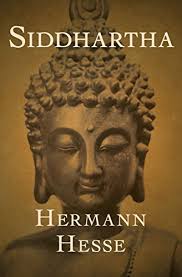Siddhartha Page #14
Siddhartha is a novel by Hermann Hesse that deals with the spiritual journey of self-discovery of a man named Siddhartha during the time of the Gautama Buddha. The book, Hesse's ninth novel, was written in German, in a simple, lyrical style.
The friend advised the merchant: "Give him from the business he conducts for you a third of the profits, but let him also be liable for the same amount of the losses, when there is a loss. Then, he'll become more zealous." Kamaswami followed the advice. But Siddhartha cared little about this. When he made a profit, he accepted it with equanimity; when he made losses, he laughed and said: "Well, look at this, so this one turned out badly!" It seemed indeed, as if he did not care about the business. At one time, he travelled to a village to buy a large harvest of rice there. But when he got there, the rice had already been sold to another merchant. Nevertheless, Siddhartha stayed for several days in that village, treated the farmers for a drink, gave copper-coins to their children, joined in the celebration of a wedding, and returned extremely satisfied from his trip. Kamaswami held against him that he had not turned back right away, that he had wasted time and money. Siddhartha answered: "Stop scolding, dear friend! Nothing was ever achieved by scolding. If a loss has occurred, let me bear that loss. I am very satisfied with this trip. I have gotten to know many kinds of people, a Brahman has become my friend, children have sat on my knees, farmers have shown me their fields, nobody knew that I was a merchant." "That's all very nice," exclaimed Kamaswami indignantly, "but in fact, you are a merchant after all, one ought to think! Or might you have only travelled for your amusement?" "Surely," Siddhartha laughed, "surely I have travelled for my amusement. For what else? I have gotten to know people and places, I have received kindness and trust, I have found friendship. Look, my dear, if I had been Kamaswami, I would have travelled back, being annoyed and in a hurry, as soon as I had seen that my purchase had been rendered impossible, and time and money would indeed have been lost. But like this, I've had a few good days, I've learned, had joy, I've neither harmed myself nor others by annoyance and hastiness. And if I'll ever return there again, perhaps to buy an upcoming harvest, or for whatever purpose it might be, friendly people will receive me in a friendly and happy manner, and I will praise myself for not showing any hurry and displeasure at that time. So, leave it as it is, my friend, and don't harm yourself by scolding! If the day will come, when you will see: this Siddhartha is harming me, then speak a word and Siddhartha will go on his own path. But until then, let's be satisfied with one another." Futile were also the merchant's attempts, to convince Siddhartha that he should eat his bread. Siddhartha ate his own bread, or rather they both ate other people's bread, all people's bread. Siddhartha never listened to Kamaswami's worries and Kamaswami had many worries. Whether there was a business-deal going on which was in danger of failing, or whether a shipment of merchandise seemed to have been lost, or a debtor seemed to be unable to pay, Kamaswami could never convince his partner that it would be useful to utter a few words of worry or anger, to have wrinkles on the forehead, to sleep badly. When, one day, Kamaswami held against him that he had learned everything he knew from him, he replied: "Would you please not kid me with such jokes! What I've learned from you is how much a basket of fish costs and how much interests may be charged on loaned money. These are your areas of expertise. I haven't learned to think from you, my dear Kamaswami, you ought to be the one seeking to learn from me." Indeed his soul was not with the trade. The business was good enough to provide him with the money for Kamala, and it earned him much more than he needed. Besides from this, Siddhartha's interest and curiosity was only concerned with the people, whose businesses, crafts, worries, pleasures, and acts of foolishness used to be as alien and distant to him as the moon. However easily he succeeded in talking to all of them, in living with all of them, in learning from all of them, he was still aware that there was something which separated him from them and this separating factor was him being a Samana. He saw mankind going through life in a childlike or animallike manner, which he loved and also despised at the same time. He saw them toiling, saw them suffering, and becoming gray for the sake of things which seemed to him to entirely unworthy of this price, for money, for little pleasures, for being slightly honoured, he saw them scolding and insulting each other, he saw them complaining about pain at which a Samana would only smile, and suffering because of deprivations which a Samana would not feel. He was open to everything, these people brought his way. Welcome was the merchant who offered him linen for sale, welcome was the debtor who sought another loan, welcome was the beggar who told him for one hour the story of his poverty and who was not half as poor as any given Samana. He did not treat the rich foreign merchant any different than the servant who shaved him and the street-vendor whom he let cheat him out of some small change when buying bananas. When Kamaswami came to him, to complain about his worries or to reproach him concerning his business, he listened curiously and happily, was puzzled by him, tried to understand him, consented that he was a little bit right, only as much as he considered indispensable, and turned away from him, towards the next person who would ask for him. And there were many who came to him, many to do business with him, many to cheat him, many to draw some secret out of him, many to appeal to his sympathy, many to get his advice. He gave advice, he pitied, he made gifts, he let them cheat him a bit, and this entire game and the passion with which all people played this game occupied his thoughts just as much as the gods and Brahmans used to occupy them. At times he felt, deep in his chest, a dying, quiet voice, which admonished him quietly, lamented quietly; he hardly perceived it. And then, for an hour, he became aware of the strange life he was leading, of him doing lots of things which were only a game, of, though being happy and feeling joy at times, real life still passing him by and not touching him. As a ball-player plays with his balls, he played with his business-deals, with the people around him, watched them, found amusement in them; with his heart, with the source of his being, he was not with them. The source ran somewhere, far away from him, ran and ran invisibly, had nothing to do with his life any more. And at several times he suddenly became scared on account of such thoughts and wished that he would also be gifted with the ability to participate in all of this childlike-naive occupations of the daytime with passion and with his heart, really to live, really to act, really to enjoy and to live instead of just standing by as a spectator. But again and again, he came back to beautiful Kamala, learned the art of love, practised the cult of lust, in which more than in anything else giving and taking becomes one, chatted with her, learned from her, gave her advice, received advice. She understood him better than Govinda used to understand him, she was more similar to him.
Translation
Translate and read this book in other languages:
Select another language:
- - Select -
- 简体中文 (Chinese - Simplified)
- 繁體中文 (Chinese - Traditional)
- Español (Spanish)
- Esperanto (Esperanto)
- 日本語 (Japanese)
- Português (Portuguese)
- Deutsch (German)
- العربية (Arabic)
- Français (French)
- Русский (Russian)
- ಕನ್ನಡ (Kannada)
- 한국어 (Korean)
- עברית (Hebrew)
- Gaeilge (Irish)
- Українська (Ukrainian)
- اردو (Urdu)
- Magyar (Hungarian)
- मानक हिन्दी (Hindi)
- Indonesia (Indonesian)
- Italiano (Italian)
- தமிழ் (Tamil)
- Türkçe (Turkish)
- తెలుగు (Telugu)
- ภาษาไทย (Thai)
- Tiếng Việt (Vietnamese)
- Čeština (Czech)
- Polski (Polish)
- Bahasa Indonesia (Indonesian)
- Românește (Romanian)
- Nederlands (Dutch)
- Ελληνικά (Greek)
- Latinum (Latin)
- Svenska (Swedish)
- Dansk (Danish)
- Suomi (Finnish)
- فارسی (Persian)
- ייִדיש (Yiddish)
- հայերեն (Armenian)
- Norsk (Norwegian)
- English (English)
Citation
Use the citation below to add this book to your bibliography:
Style:MLAChicagoAPA
"Siddhartha Books." Literature.com. STANDS4 LLC, 2024. Web. 23 Nov. 2024. <https://www.literature.com/book/siddhartha_24>.




Discuss this Siddhartha book with the community:
Report Comment
We're doing our best to make sure our content is useful, accurate and safe.
If by any chance you spot an inappropriate comment while navigating through our website please use this form to let us know, and we'll take care of it shortly.
Attachment
You need to be logged in to favorite.
Log In